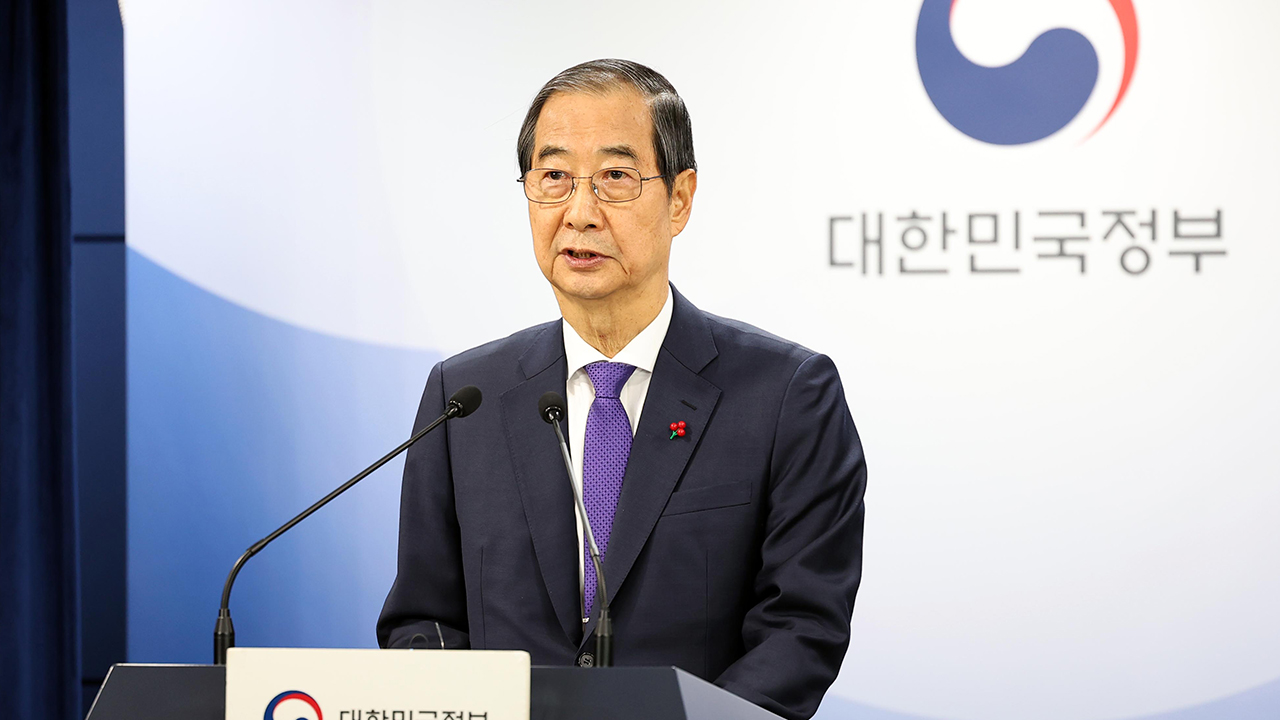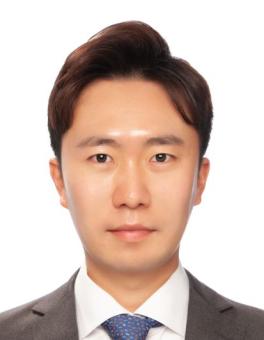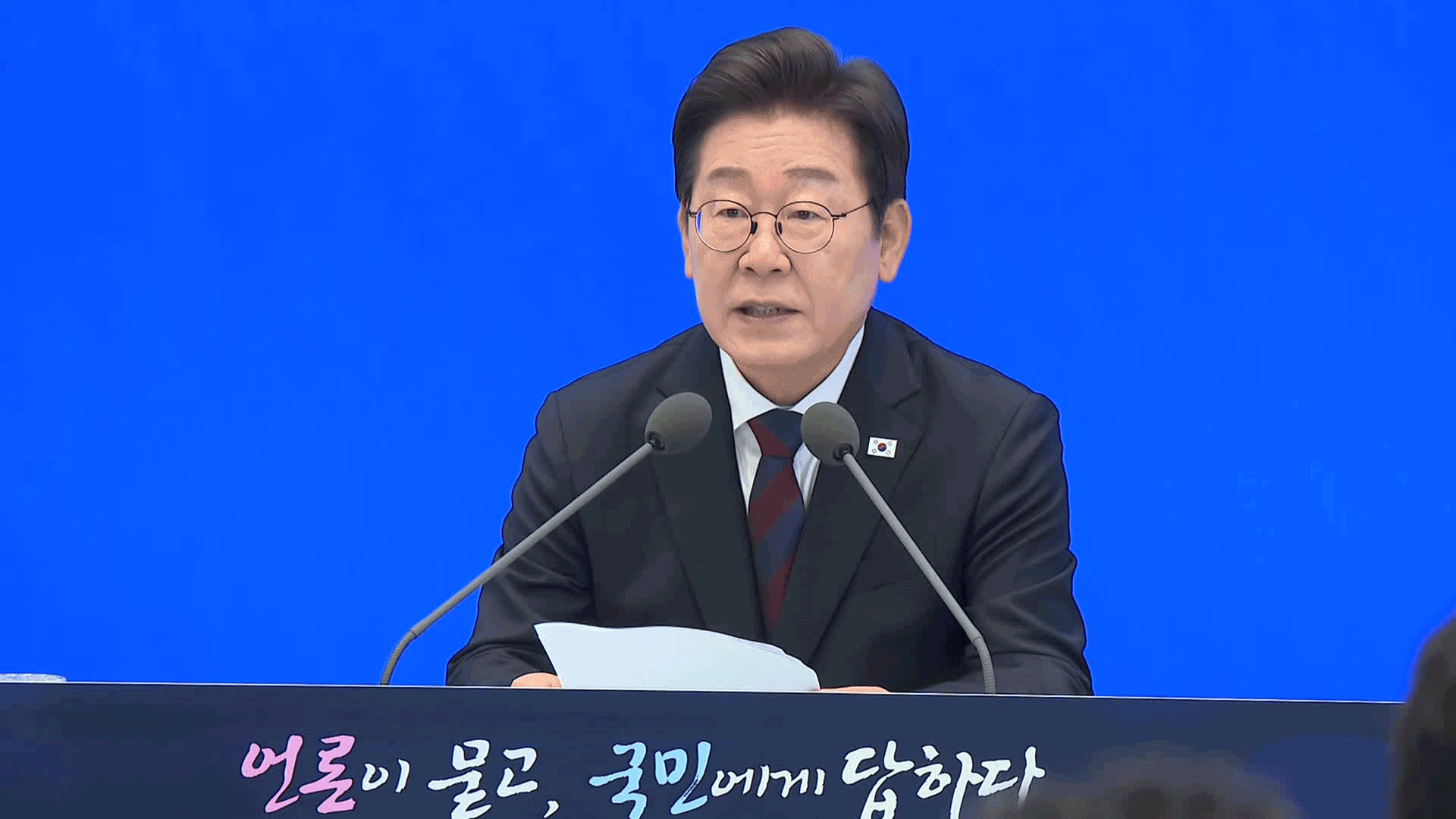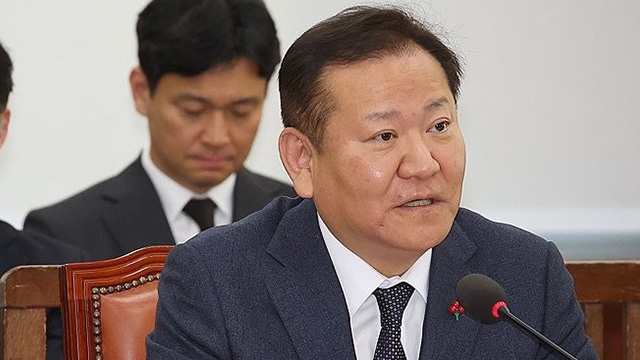Is impeachment of Acting President imminent? Political outlook ahead
입력 2024.12.26 (23:56)
읽어주기 기능은 크롬기반의
브라우저에서만 사용하실 수 있습니다.
[Anchor]
We are facing an unprecedented impeachment situation, with both a president and an acting president.
Let's take a closer look with political reporter Jeong Sae-bae.
Welcome, reporter Jeong.
First, Acting President Han Duck-soo clearly expressed his intentions just before the National Assembly's plenary session.
Was this expected?
What is the intention behind it?
[Reporter]
No, it was not.
The fact that he would make a public address to the nation was announced just prior.
The Prime Minister's Office has consistently stated that the handling of the special prosecutor law and the appointment of constitutional judges must be based on an agreement between the ruling and opposition parties, but they had been closer to saying, "We will continue to review," rather than clearly stating, "We cannot proceed without an agreement."
It seems that he was trying to persuade the political circles one last time.
In a situation where the opposition is set to elect constitutional judges alone, it also appears that he intended to directly convey to public opinion that the political responsibility lies with the National Assembly.
[Anchor]
Let's touch on this point as well.
Is the appointment of constitutional judges an passive or active exercise of authority? The interpretations differ completely between the ruling and opposition parties, right?
[Reporter]
The opposition views the appointment of constitutional judges elected by the National Assembly as a passive exercise of authority compared to the veto power over bills.
They essentially believe that it is sufficient to just issue the appointment letters.
The Prime Minister's Office, on the other hand, sees it quite differently.
They believe that the appointment of constitutional judges is a "significant exclusive authority of the president" that the acting president should refrain from exercising, and therefore, if it must be exercised, it should be discussed with the National Assembly.
This is similar to the logic of the People Power Party, which divides presidential authority into "head of state authority" and "head of government authority."
However, some frustration was also expressed today regarding the ruling party's complete lack of consultation with the opposition, stating that "the acting president has no appointment authority."
Given that the likelihood of the ruling and opposition parties reaching an agreement on the special prosecutor law or the appointment of constitutional judges is already slim, there are also suggestions that the continued calls for National Assembly discussions were an attempt to build a justification for postponing the appointments.
[Anchor]
As we saw earlier, another point of contention is the quorum for the passage of the impeachment motion.
What will happen tomorrow (12.27)?
[Reporter]
Yes, it is reported that before the vote tomorrow, National Assembly Speaker Woo Won-shik will finalize his position on the quorum issue.
Given the circumstances, Speaker Woo is also being extremely cautious with his words, and the Prime Minister's Office is not mentioning the quorum issue at all, stating that it is not within their judgment area.
However, there are claims, mainly from the ruling party, that the Speaker has no authority to make a judgment when interpretations of constitutional provisions diverge, which is likely to lead to further controversy.
[Anchor]
If the impeachment motion passes with a majority vote, the acting president is being urged by the ruling party not to accept it and to continue performing his duties. Will the acting president do that?
[Reporter]
He is currently refraining from making any comments, stating, "There is no position on this matter."
There have been speculations that if the impeachment motion is passed, the Prime Minister's Office will immediately begin legal responses alongside the ruling party.
However, the Prime Minister's Office has stated that this is not the case.
The ruling party also argues that the majority vote itself is invalid, so even if the impeachment motion passes, the acting president can continue to attend work.
Nevertheless, the Prime Minister's Office believes that a suspension of duties according to the constitution is inevitable and is reportedly contemplating their response.
If legal disputes actually arise, the conflict between the ruling and opposition parties over the acting president's duties and the political chaos will likely intensify.
[Anchor]
Thank you, reporter Jeong Sae-bae.
We are facing an unprecedented impeachment situation, with both a president and an acting president.
Let's take a closer look with political reporter Jeong Sae-bae.
Welcome, reporter Jeong.
First, Acting President Han Duck-soo clearly expressed his intentions just before the National Assembly's plenary session.
Was this expected?
What is the intention behind it?
[Reporter]
No, it was not.
The fact that he would make a public address to the nation was announced just prior.
The Prime Minister's Office has consistently stated that the handling of the special prosecutor law and the appointment of constitutional judges must be based on an agreement between the ruling and opposition parties, but they had been closer to saying, "We will continue to review," rather than clearly stating, "We cannot proceed without an agreement."
It seems that he was trying to persuade the political circles one last time.
In a situation where the opposition is set to elect constitutional judges alone, it also appears that he intended to directly convey to public opinion that the political responsibility lies with the National Assembly.
[Anchor]
Let's touch on this point as well.
Is the appointment of constitutional judges an passive or active exercise of authority? The interpretations differ completely between the ruling and opposition parties, right?
[Reporter]
The opposition views the appointment of constitutional judges elected by the National Assembly as a passive exercise of authority compared to the veto power over bills.
They essentially believe that it is sufficient to just issue the appointment letters.
The Prime Minister's Office, on the other hand, sees it quite differently.
They believe that the appointment of constitutional judges is a "significant exclusive authority of the president" that the acting president should refrain from exercising, and therefore, if it must be exercised, it should be discussed with the National Assembly.
This is similar to the logic of the People Power Party, which divides presidential authority into "head of state authority" and "head of government authority."
However, some frustration was also expressed today regarding the ruling party's complete lack of consultation with the opposition, stating that "the acting president has no appointment authority."
Given that the likelihood of the ruling and opposition parties reaching an agreement on the special prosecutor law or the appointment of constitutional judges is already slim, there are also suggestions that the continued calls for National Assembly discussions were an attempt to build a justification for postponing the appointments.
[Anchor]
As we saw earlier, another point of contention is the quorum for the passage of the impeachment motion.
What will happen tomorrow (12.27)?
[Reporter]
Yes, it is reported that before the vote tomorrow, National Assembly Speaker Woo Won-shik will finalize his position on the quorum issue.
Given the circumstances, Speaker Woo is also being extremely cautious with his words, and the Prime Minister's Office is not mentioning the quorum issue at all, stating that it is not within their judgment area.
However, there are claims, mainly from the ruling party, that the Speaker has no authority to make a judgment when interpretations of constitutional provisions diverge, which is likely to lead to further controversy.
[Anchor]
If the impeachment motion passes with a majority vote, the acting president is being urged by the ruling party not to accept it and to continue performing his duties. Will the acting president do that?
[Reporter]
He is currently refraining from making any comments, stating, "There is no position on this matter."
There have been speculations that if the impeachment motion is passed, the Prime Minister's Office will immediately begin legal responses alongside the ruling party.
However, the Prime Minister's Office has stated that this is not the case.
The ruling party also argues that the majority vote itself is invalid, so even if the impeachment motion passes, the acting president can continue to attend work.
Nevertheless, the Prime Minister's Office believes that a suspension of duties according to the constitution is inevitable and is reportedly contemplating their response.
If legal disputes actually arise, the conflict between the ruling and opposition parties over the acting president's duties and the political chaos will likely intensify.
[Anchor]
Thank you, reporter Jeong Sae-bae.
■ 제보하기
▷ 카카오톡 : 'KBS제보' 검색, 채널 추가
▷ 전화 : 02-781-1234, 4444
▷ 이메일 : kbs1234@kbs.co.kr
▷ 유튜브, 네이버, 카카오에서도 KBS뉴스를 구독해주세요!
- Is impeachment of Acting President imminent? Political outlook ahead
-
- 입력 2024-12-26 23:56:19

[Anchor]
We are facing an unprecedented impeachment situation, with both a president and an acting president.
Let's take a closer look with political reporter Jeong Sae-bae.
Welcome, reporter Jeong.
First, Acting President Han Duck-soo clearly expressed his intentions just before the National Assembly's plenary session.
Was this expected?
What is the intention behind it?
[Reporter]
No, it was not.
The fact that he would make a public address to the nation was announced just prior.
The Prime Minister's Office has consistently stated that the handling of the special prosecutor law and the appointment of constitutional judges must be based on an agreement between the ruling and opposition parties, but they had been closer to saying, "We will continue to review," rather than clearly stating, "We cannot proceed without an agreement."
It seems that he was trying to persuade the political circles one last time.
In a situation where the opposition is set to elect constitutional judges alone, it also appears that he intended to directly convey to public opinion that the political responsibility lies with the National Assembly.
[Anchor]
Let's touch on this point as well.
Is the appointment of constitutional judges an passive or active exercise of authority? The interpretations differ completely between the ruling and opposition parties, right?
[Reporter]
The opposition views the appointment of constitutional judges elected by the National Assembly as a passive exercise of authority compared to the veto power over bills.
They essentially believe that it is sufficient to just issue the appointment letters.
The Prime Minister's Office, on the other hand, sees it quite differently.
They believe that the appointment of constitutional judges is a "significant exclusive authority of the president" that the acting president should refrain from exercising, and therefore, if it must be exercised, it should be discussed with the National Assembly.
This is similar to the logic of the People Power Party, which divides presidential authority into "head of state authority" and "head of government authority."
However, some frustration was also expressed today regarding the ruling party's complete lack of consultation with the opposition, stating that "the acting president has no appointment authority."
Given that the likelihood of the ruling and opposition parties reaching an agreement on the special prosecutor law or the appointment of constitutional judges is already slim, there are also suggestions that the continued calls for National Assembly discussions were an attempt to build a justification for postponing the appointments.
[Anchor]
As we saw earlier, another point of contention is the quorum for the passage of the impeachment motion.
What will happen tomorrow (12.27)?
[Reporter]
Yes, it is reported that before the vote tomorrow, National Assembly Speaker Woo Won-shik will finalize his position on the quorum issue.
Given the circumstances, Speaker Woo is also being extremely cautious with his words, and the Prime Minister's Office is not mentioning the quorum issue at all, stating that it is not within their judgment area.
However, there are claims, mainly from the ruling party, that the Speaker has no authority to make a judgment when interpretations of constitutional provisions diverge, which is likely to lead to further controversy.
[Anchor]
If the impeachment motion passes with a majority vote, the acting president is being urged by the ruling party not to accept it and to continue performing his duties. Will the acting president do that?
[Reporter]
He is currently refraining from making any comments, stating, "There is no position on this matter."
There have been speculations that if the impeachment motion is passed, the Prime Minister's Office will immediately begin legal responses alongside the ruling party.
However, the Prime Minister's Office has stated that this is not the case.
The ruling party also argues that the majority vote itself is invalid, so even if the impeachment motion passes, the acting president can continue to attend work.
Nevertheless, the Prime Minister's Office believes that a suspension of duties according to the constitution is inevitable and is reportedly contemplating their response.
If legal disputes actually arise, the conflict between the ruling and opposition parties over the acting president's duties and the political chaos will likely intensify.
[Anchor]
Thank you, reporter Jeong Sae-bae.
We are facing an unprecedented impeachment situation, with both a president and an acting president.
Let's take a closer look with political reporter Jeong Sae-bae.
Welcome, reporter Jeong.
First, Acting President Han Duck-soo clearly expressed his intentions just before the National Assembly's plenary session.
Was this expected?
What is the intention behind it?
[Reporter]
No, it was not.
The fact that he would make a public address to the nation was announced just prior.
The Prime Minister's Office has consistently stated that the handling of the special prosecutor law and the appointment of constitutional judges must be based on an agreement between the ruling and opposition parties, but they had been closer to saying, "We will continue to review," rather than clearly stating, "We cannot proceed without an agreement."
It seems that he was trying to persuade the political circles one last time.
In a situation where the opposition is set to elect constitutional judges alone, it also appears that he intended to directly convey to public opinion that the political responsibility lies with the National Assembly.
[Anchor]
Let's touch on this point as well.
Is the appointment of constitutional judges an passive or active exercise of authority? The interpretations differ completely between the ruling and opposition parties, right?
[Reporter]
The opposition views the appointment of constitutional judges elected by the National Assembly as a passive exercise of authority compared to the veto power over bills.
They essentially believe that it is sufficient to just issue the appointment letters.
The Prime Minister's Office, on the other hand, sees it quite differently.
They believe that the appointment of constitutional judges is a "significant exclusive authority of the president" that the acting president should refrain from exercising, and therefore, if it must be exercised, it should be discussed with the National Assembly.
This is similar to the logic of the People Power Party, which divides presidential authority into "head of state authority" and "head of government authority."
However, some frustration was also expressed today regarding the ruling party's complete lack of consultation with the opposition, stating that "the acting president has no appointment authority."
Given that the likelihood of the ruling and opposition parties reaching an agreement on the special prosecutor law or the appointment of constitutional judges is already slim, there are also suggestions that the continued calls for National Assembly discussions were an attempt to build a justification for postponing the appointments.
[Anchor]
As we saw earlier, another point of contention is the quorum for the passage of the impeachment motion.
What will happen tomorrow (12.27)?
[Reporter]
Yes, it is reported that before the vote tomorrow, National Assembly Speaker Woo Won-shik will finalize his position on the quorum issue.
Given the circumstances, Speaker Woo is also being extremely cautious with his words, and the Prime Minister's Office is not mentioning the quorum issue at all, stating that it is not within their judgment area.
However, there are claims, mainly from the ruling party, that the Speaker has no authority to make a judgment when interpretations of constitutional provisions diverge, which is likely to lead to further controversy.
[Anchor]
If the impeachment motion passes with a majority vote, the acting president is being urged by the ruling party not to accept it and to continue performing his duties. Will the acting president do that?
[Reporter]
He is currently refraining from making any comments, stating, "There is no position on this matter."
There have been speculations that if the impeachment motion is passed, the Prime Minister's Office will immediately begin legal responses alongside the ruling party.
However, the Prime Minister's Office has stated that this is not the case.
The ruling party also argues that the majority vote itself is invalid, so even if the impeachment motion passes, the acting president can continue to attend work.
Nevertheless, the Prime Minister's Office believes that a suspension of duties according to the constitution is inevitable and is reportedly contemplating their response.
If legal disputes actually arise, the conflict between the ruling and opposition parties over the acting president's duties and the political chaos will likely intensify.
[Anchor]
Thank you, reporter Jeong Sae-bae.
-
-

정새배 기자 newboat@kbs.co.kr
정새배 기자의 기사 모음
-
이 기사가 좋으셨다면
-
좋아요
0
-
응원해요
0
-
후속 원해요
0












![[단독] 김민석 총리, 취임 첫 일정으로 ‘송미령 반대’ 농민단체 농성장 방문](/data/news/2025/07/03/20250703_YUTdgQ.png)
![[단독] ‘스테로이드’부터 ‘임신중지약’까지…해외 의약품 불법 유통 11만 건](/data/news/2025/07/03/20250703_qpUU1y.png)

이 기사에 대한 의견을 남겨주세요.